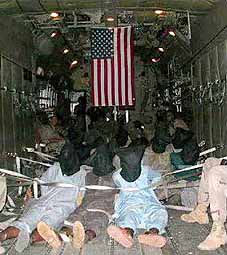Much early American writing is derivative: European forms and styles transferred to new locales. For example, Wieland and other novels by Charles Brockden Brown (1771-1810) are energetic imitations of the Gothic novels then being written in England. Even the well-wrought tales of Washington Irving (1783-1859), notably "Rip Van Winkle" and "The Legend of Sleepy Hollow," seem comfortably European despite their New World settings.
Perhaps the first American writer to produce boldly new fiction and poetry was Edgar Allan Poe (1809-1849). In 1835, Poe began writing short stories -- including "The Masque of the Red Death," "The Pit and the Pendulum," "The Fall of the House of Usher," and "The Murders in the Rue Morgue" -- that explore previously hidden levels of human psychology and push the boundaries of fiction toward mystery and fantasy.
Meanwhile, in 1837, the young Nathaniel Hawthorne (1804-1864) collected some of his stories as Twice-Told Tales, a volume rich in symbolism and occult incidents. Hawthorne went on to write full-length "romances," quasi-allegorical novels that explore such themes as guilt, pride, and emotional repression in his native New England. His masterpiece, The Scarlet Letter, is the stark drama of a woman cast out of her community for committing adultery.
Hawthorne's fiction had a profound impact on his friend Herman Melville (1819-1891), who first made a name for himself by turning material from his seafaring days into exotic novels. Inspired by Hawthorne's example, Melville went on to write novels rich in philosophical speculation. In Moby-Dick, an adventurous whaling voyage becomes the vehicle for examining such themes as obsession, the nature of evil, and human struggle against the elements. In another fine work, the short novel Billy Budd, Melville dramatizes the conflicting claims of duty and compassion on board a ship in time of war. His more profound books sold poorly, and he had been long forgotten by the time of his death. He was rediscovered in the early decades of the 20th century.
In 1836, Ralph Waldo Emerson (1803-1882), an ex-minister, published a startling nonfiction work called Nature, in which he claimed it was possible to dispense with organized religion and reach a lofty spiritual state by studying and responding to the natural world. His work influenced not only the writers who gathered around him, forming a movement known as Transcendentalism, but also the public, who heard him lecture.
Whitman was also a poet of the body -- "the body electric," as he called it. In Studies in Classic American Literature, the English novelist D.H. Lawrence wrote that Whitman "was the first to smash the old moral conception that the soul of man is something `superior' and `above' the flesh."
American writers also expressed the disillusionment following upon the war. The stories and novels of F. Scott Fitzgerald (1896-1940) capture the restless, pleasure-hungry, defiant mood of the 1920s. Fitzgerald's characteristic theme, expressed poignantly in The Great Gatsby, is the tendency of youth's golden dreams to dissolve in failure and disappointment.
Ernest Hemingway (1899-1961) saw violence and death first-hand as an ambulance driver in World War I, and the senseless carnage persuaded him that abstract language was mostly empty and misleading. He cut out unnecessary words from his writing, simplified the sentence structure, and concentrated on concrete objects and actions. He adhered to a moral code that emphasized courage under pressure, and his protagonists were strong, silent men who often dealt awkwardly with women. The Sun Also Rises and A Farewell to Arms are generally considered his best novels; he won the Nobel Prize for literature in 1954.
In addition to fiction, the 1920s were a rich period for drama. There had not been an important American dramatist until Eugene O'Neill (1888-1953) began to write his plays. Winner of the Nobel Prize for literature in 1936, O'Neill drew upon classical mythology, the Bible, and the new science of psychology to explore inner life. He wrote frankly about sex and family quarrels, but his preoccupation was with the individual's search for identity. One of his greatest works is Long Day's Journey Into Night, a harrowing drama, small in scale but large in theme, based largely on his own family.
From Irving and Hawthorne to the present day, the short story has been a favorite American form. One of its 20th-century masters was John Cheever (1912-1982), who brought yet another facet of American life into the realm of literature: the affluent suburbs that have grown up around most major cities. Cheever was long associated with The New Yorker, a magazine noted for its wit and sophistication.
Although trend-spotting in literature that is still being written can be dangerous, the recent emergence of fiction by members of minority groups has been striking. Here are only a few examples. Native American writer Leslie Marmon Silko (1948- ) uses colloquial language and traditional stories to fashion haunting, lyrical poems such as "In Cold Storm Light." Amy Tan (1952- ), of Chinese descent, has described her parents' early struggles in California in The Joy Luck Club. Oscar Hijuelos (1951- ), a writer with roots in Cuba, won the 1991 Pulitzer Prize for his novel The Mambo Kings Play Songs of Love. In a series of novels beginning with A Boy's Own Story, Edmund White (1940- ) has captured the anguish and comedy of growing up homosexual in America. Finally, African-American women have produced some of the most powerful fiction of recent decades. One of them, Toni Morrison (1931- ), author of Beloved and other works, won the Nobel Prize for literature in 1993, only the second American woman to be so honored.






